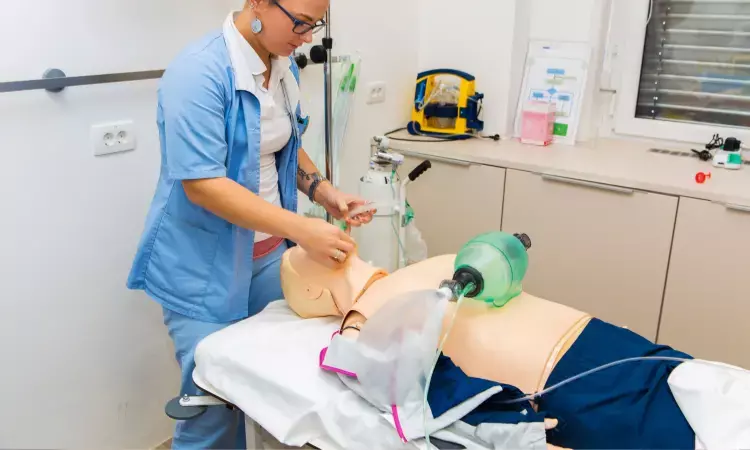- Home
- Medical news & Guidelines
- Anesthesiology
- Cardiology and CTVS
- Critical Care
- Dentistry
- Dermatology
- Diabetes and Endocrinology
- ENT
- Gastroenterology
- Medicine
- Nephrology
- Neurology
- Obstretics-Gynaecology
- Oncology
- Ophthalmology
- Orthopaedics
- Pediatrics-Neonatology
- Psychiatry
- Pulmonology
- Radiology
- Surgery
- Urology
- Laboratory Medicine
- Diet
- Nursing
- Paramedical
- Physiotherapy
- Health news
- Fact Check
- Bone Health Fact Check
- Brain Health Fact Check
- Cancer Related Fact Check
- Child Care Fact Check
- Dental and oral health fact check
- Diabetes and metabolic health fact check
- Diet and Nutrition Fact Check
- Eye and ENT Care Fact Check
- Fitness fact check
- Gut health fact check
- Heart health fact check
- Kidney health fact check
- Medical education fact check
- Men's health fact check
- Respiratory fact check
- Skin and hair care fact check
- Vaccine and Immunization fact check
- Women's health fact check
- AYUSH
- State News
- Andaman and Nicobar Islands
- Andhra Pradesh
- Arunachal Pradesh
- Assam
- Bihar
- Chandigarh
- Chattisgarh
- Dadra and Nagar Haveli
- Daman and Diu
- Delhi
- Goa
- Gujarat
- Haryana
- Himachal Pradesh
- Jammu & Kashmir
- Jharkhand
- Karnataka
- Kerala
- Ladakh
- Lakshadweep
- Madhya Pradesh
- Maharashtra
- Manipur
- Meghalaya
- Mizoram
- Nagaland
- Odisha
- Puducherry
- Punjab
- Rajasthan
- Sikkim
- Tamil Nadu
- Telangana
- Tripura
- Uttar Pradesh
- Uttrakhand
- West Bengal
- Medical Education
- Industry
Remifentanil inferior to neuromuscular blockers for successful tracheal intubation in adults at risk of aspiration

France: An original investigation published in JAMA has concluded that Remifentanil was statistically inferior to neuromuscular blockers in adults at risk of aspiration during rapid sequence intubation.
There remains uncertainty on whether a rapid-onset opioid is non-inferior to a rapid-onset neuromuscular blocker during rapid sequence intubation?
Grillot et al. and colleagues from Nantes Université and 2Université Lille, France, did a study with the main objective of determining, "Are rapid-onset opioids non-inferior to rapid-onset neuromuscular blockers for rapid sequence intubation?"
The study summary includes the following:
- The study was carried out in 15 hospitals in France. There were a total of 1150 randomized patients with a mean age of 51 years.
- Patients were randomized as:
Five hundred seventy-five patients received intravenous Remifentanil 3 to 4 μg/kg immediately after injection of a hypnotic.
Five hundred seventy-five patients received neuromuscular blockers, intravenous succinylcholine or rocuronium 1 mg/kg immediately after injection of a hypnotic.
- The researchers measured the primary outcome as successful tracheal intubation without major complications (in the first attempt).
- The successful intubation on the first attempt occurred in 374 out of 575 patients, constituting 66.1 % receiving Remifentanil.
- Among patients receiving Neuromuscular blockers, 408 out of 575 patients constituting 71.6 %, had successful intubation on the first attempt.
- Remifentanil was inferior to neuromuscular blockers. The adjusted between-group difference was –6.1%.
- Nineteen patients with Remifentanil and 3 with neuromuscular blockers had hemodynamic instability with an adjusted difference of 2.8%.
To conclude, as per the study's findings, Remifentanil was inferior to neuromuscular blockers in the rate of successful tracheal intubation without major complications.
Further reading:
Grillot N et al. Effect of Remifentanil vs Neuromuscular Blockers During Rapid Sequence Intubation on Successful Intubation Without Major Complications Among Patients at Risk of Aspiration: A Randomized Clinical Trial. JAMA. 2023;329(1):28–38. doi:10.1001/jama.2022.23550
BDS, MDS in Periodontics and Implantology
Dr. Aditi Yadav is a BDS, MDS in Periodontics and Implantology. She has a clinical experience of 5 years as a laser dental surgeon. She also has a Diploma in clinical research and pharmacovigilance and is a Certified data scientist. She is currently working as a content developer in e-health services. Dr. Yadav has a keen interest in Medical Journalism and is actively involved in Medical Research writing.
Dr Kamal Kant Kohli-MBBS, DTCD- a chest specialist with more than 30 years of practice and a flair for writing clinical articles, Dr Kamal Kant Kohli joined Medical Dialogues as a Chief Editor of Medical News. Besides writing articles, as an editor, he proofreads and verifies all the medical content published on Medical Dialogues including those coming from journals, studies,medical conferences,guidelines etc. Email: drkohli@medicaldialogues.in. Contact no. 011-43720751


